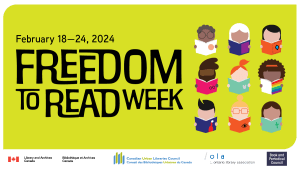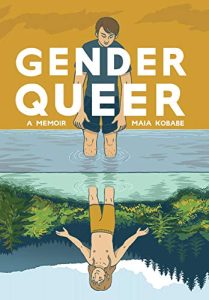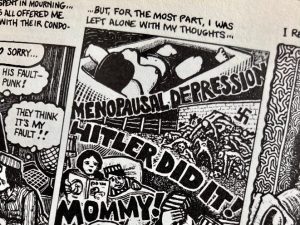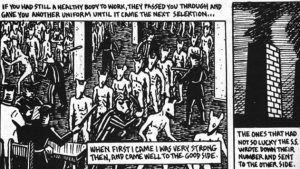February is an exciting time for libraries as it houses Canada’s Freedom to Read Week, which is taking place February 18th-24th! It’s an annual event that encourages all Canadians to think about and reaffirm our commitment to intellectual freedom, which is guaranteed to us under the Canadian Charter of Rights and Freedoms.

Our intellectual freedoms give us the right to both seek and receive information from all points of view, without restrictions! It protects our right to read, listen, watch, write, and speak our beliefs and opinions. These freedoms able us to experience different ideas and hear all sides of an issue so we can gather information to make well-informed decisions. Upholding these rights are a year-long responsibility of libraries, but during this week we get to go big and show our patrons what it looks like when these rights are infringed on. Certainly, a cause for a celebration, right?
In the past, a book ban would usually begin with a challenge from a local patron, go through a review of the text, and end with a decision from the library’s board. However, with the use of social media, partisan groups are using sites like Facebook to rally outrage over materials that do not reflect their personal ways of life. After this group has been properly riled up over something that may or may not be true, the targeted library is flooded with comments on their social media sites, many of which are not coming from local users.

To see the best examples of book bans gone wild, we must look to the land of the free; The United States. In 2022 a graphic novel memoir called Gender Queer by debut author, Maia Kobabe, was the hottest book to ban. In fact, it ended up being the top banned book in the United States that year with 151 challenges! The book is an autobiography intended for patrons at the age of 16+ where Maia details their journey of self-identity, sexuality, and her struggles with coming out to her family as nonbinary and asexual. The American conservative political organization, Moms for Liberty who advocates against school curriculums that mention LGBTQ+ rights, race and ethnicity, discrimination, and critical race theory, has multiple chapters who have campaigned to ban books that address gender and sexuality, including Gender Queer. In December 2021, instead of filing a challenge against the book, the Wake County, North Carolina chapter filed a criminal complaint against the Wake Country Public School system, claiming that they were violating obscenity laws by having Gender Queer, and other LGBTQ+ titles in their libraries. Julie Anne, who filed one of the complaints stated that her group saw lists of books that parents had been objecting to on social media, and they decided they needed to look into the book themselves. This snowballed on social media and the book was banned in dozens of school districts and removed from libraries across the country including Alaska, Iowa, Texas, and Pennsylvania. In some schools, it was removed preemptively, without a formal complaint.
It’s not only LGBTQ+ materials that these groups are targeting. Maus: A Survivor’s Tale by Art Spiegelman is a Pulitzer Prize winning 1986 graphic novel that depicts Spiegelman interviewing his father about his experience as a Polish Jew and holocaust survivor. The art style which depicts Jewish people as mice and Germans as cats, makes the concept of war, genocide, and PTSD accessible to middle and high school students. In January 2022 a McMinn County school district in made national news due to their unanimous decision to ban Maus from their eighth grad curriculum. They deemed the text inappropriate for 13-year-olds due to its inclusion of swear words like “god damn” and nudity that was labeled pornographic.
Two scenes depicted nudity, one in each volume. The scene from the first book is in a panel no bigger than two inches and depicts his mothers’ suicide in the bath following the war.

The second book has a scene that showed the males, who were depicted as mice, arriving at Auschwitz and having to strip down to receive prison camp clothing.

Pornographic materials are defined as 'erotic behavior that is intended to cause sexual excitement'. So by definition, both items are far from pornographic, and yet these books were banned. One board member stated that he had not “seen the book [or] read the whole book,” instead admitting that he’d only “read the reviews.”
On a positive note, this highly publicized ban created a snowball effect where, at the end of the same month the book was banned, it had catapulted sales 753% to a whopping 14, 360 copies sold according to NPD Book Scan. For a brief moment the retail behemoth Amazon even sold out of copies!
This massive increase in book sales isn’t an isolated incident, Gender Queer saw a 130% increase in U.S print sales after it was banned. The board book, Antiracist Baby by Ibram X. Kendi was only criticized, not banned, by Sen. Ted Cruz in a Supreme Court hearing for Justice Ketanji Brown Jackson and it went on to increase 5000% in sales that month. These stats would suggest that banned books increase curiosity, and therefore sales, but its just the titles that get media attention from their ban that are being catapulted to the top of the sales charts. ALA estimates that between 82%-97% percent of requests to remove materials from libraries or schools go unreported and do not receive media attention.
It’s around this point you are probably thinking “okay, but this is all happening in another country”, well dear reader, I am sorry to tell you that borders do not stop social media frenzies. During the height of the Gender Queer controversies, our own library was subject to misinformation and a following rage-storm of comments with a user from southern Alberta sharing a picture of Gender Queer in our library, sat right next to a copy of Garfield in the children’s section. This would be an issue if it was true, however our copy was in the adult section, and the photo was from Lakeland Library which was evident on the spine of the book… So, while we look at our Canadian list of banned titles over the years and notice that the majority of these are from the early nineties or prior, keep in mind that the tides may turn.
Our library, and all libraries, have a core responsibility to safeguard and defend an individual’s pursuit of expressive content, including those which some groups or individuals consider unconventional, unpopular, or unacceptable. However, we cannot do it alone! This Freedom to Read week, celebrate your intellectual freedom, and defend your right to read.
To take a look at a list of banned or challenged titles, all of which are available with a library membership, visit one of our Freedom to Read lists:
-Jessie Levesque, Library Services Associate




Add a comment to: Freedom to Read